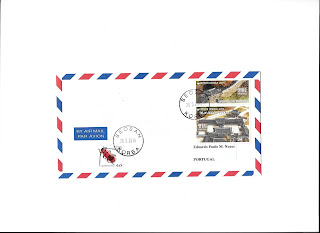This fortress was designed as an emergency capital for the Joseon dinasty (1392-1910), in a mountainous site 25 km south-east of Seoul. Built and deffended by Buddhist monk-soldiers, it could accomodate 4,000 people and fulfilled importante administrative and militar functions. Its earliest remains date from the 7th century, but it was rebuilt several times, notably in the early 17th century.
Tuesday, 1 May 2018
SOUTH KOREA
Another nice UNESCO cover from South Korea, depicting a complete set issued in 2015 celebrating the Namhansanseong Fortress, inscribed as an UNESCO site since 2014.
This fortress was designed as an emergency capital for the Joseon dinasty (1392-1910), in a mountainous site 25 km south-east of Seoul. Built and deffended by Buddhist monk-soldiers, it could accomodate 4,000 people and fulfilled importante administrative and militar functions. Its earliest remains date from the 7th century, but it was rebuilt several times, notably in the early 17th century.


This fortress was designed as an emergency capital for the Joseon dinasty (1392-1910), in a mountainous site 25 km south-east of Seoul. Built and deffended by Buddhist monk-soldiers, it could accomodate 4,000 people and fulfilled importante administrative and militar functions. Its earliest remains date from the 7th century, but it was rebuilt several times, notably in the early 17th century.
